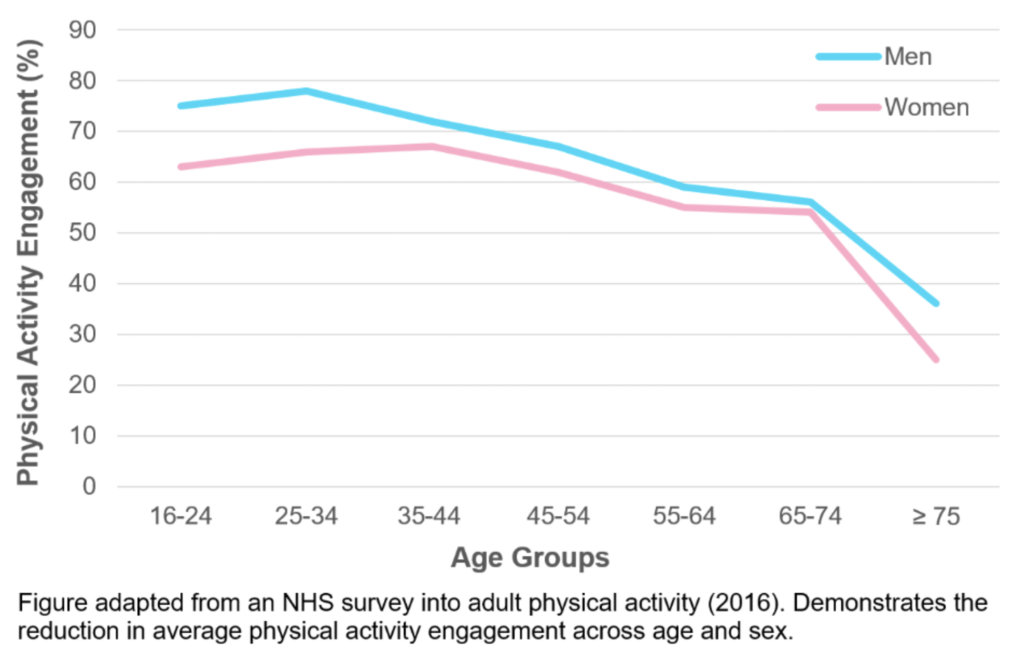Posted April 23rd 2020
According to the World Health Organisation, 29 – 42% of adults in the UK do not participate in a sufficient amount of physical activity. In adolescents, this figure is a staggering 79.9%.
To put this into perspective, ‘sufficient physical activity’ for adults is around:
- 2 hours and 30 minutes of moderate activity per week e.g. brisk walking or dancing
or - 1 hour and 15 minutes of vigorous activity per week e.g. running or walking up steps
For adolescents, sufficient physical activity is greater, at around 60 minutes of moderate-to-vigorous activity per day, equating to 7 hours per week.
Why are we not getting enough exercise?
Some might argue this is due to people being “lazy”, however, this is not necessarily the case.
A recent review highlighted that the main barrier against physical activity was a lack of time, with other common factors including a lack of willpower or motivation, depressed mood, and physical pain.

So, what do people spend their time on instead of exercise? In 2015, researchers looked at patterns of daily activity in thousands of people across nearly 30 countries.
They found that people spend the majority of their day working, and the remainder of their time is occupied by leisure, eating, and sedentary behaviours eg watching TV/ videos, and listening to radio
The consequence of busy working days, family life, and household roles are that it often leads to little remaining time for people to socialise, participate in hobbies, and to exercise.
Why should we exercise?
There has been a significant amount of research into physical activity and its benefits on both physical and mental health.
Some of the health benefits include a reduced risk of cardiovascular diseases, diabetes, and even some cancers. Similarly, regular exercise can be protective against depression and anxiety; whilst also improving general wellbeing, mood, self-esteem, and stress.
Around 3.3 million people die each year due to low levels of physical activity, making it the fourth leading cause of death, after high blood pressure, smoking, and diabetes. – Pratt (2012)
Research has even highlighted that individuals who regularly exercise after being diagnosed with a mental disorder are less likely to retain their diagnosis after one year. This suggests that physical activity can be potentially protective against the manifestation of mental disorder symptoms.

For many of us, living with physical and mental illnesses is exhausting, and so we believe that exercise will only make this worse.
One study suggested otherwise by looking into cancer patients who experience debilitating fatigue following chemotherapy. After following a regular exercise program of low-to-moderate intensity home exercises, patients of the study reported significant weight loss, increased functional ability (e.g. being able to perform daily tasks), and improved quality of life.
Therefore, whilst many of us believe that exercise is exhausting – sapping all our remaining energy – it can actually have the opposite effect, making us feel more energised, alert, and positive.
Does exercise benefit me as I age?
The natural and graceful process of ageing affects us all. Whilst it’s important to do things that we enjoy as we age, its also important to stay healthy and active. Studies have shown that people tend to be less physically active as they age, with reductions in activity starting in childhood and continuing into adulthood and older age.

A major threat of ageing that many people are aware of is dementia.
Dementia is an umbrella term used to describe most neurodegenerative disorders, some of which include, Alzheimer’s, Lewy body, Frontotemporal, Parkinson’s and Vascular dementias. Collectively, these affect 7.1% of the world’s population (equivalent to 50 million people), and around 1.3% in the UK (equivalent to 850,000 people).
Whilst physical activity may not seem an obvious way to prevent the development of Dementia, studies have suggested that this may be true. A recent review has suggested that regular physical activity, both in early and older age, can delay the development of neurodegenerative disorders and promote healthy brain functioning.
Therefore, whilst we typically think of exercise as benefitting our physical health, it can have significant long-lasting effects on our mental health also, both in early and later life.
How much is too much?
Exercise, especially high-intensity exercise, isn’t always advised for everyone.
If you are concerned about the adverse effects of exercise or have an underlying medical issue, seek advice from a health professional before taking up a new exercise regime
For most, the key to preventing any negative effects of exercise is to build up your fitness level over time.
Starting with less intense exercises (e.g. walking or cycling), and then moving onto longer duration, more intense exercises (e.g. running or boxing) when you feel ready.
Whilst doing this, it is also important to stay hydrated and to rest following intense exercises, all of which will reduce your risk of injury.
What can we do to improve our activity levels?
There are many different activities available to us; the key is to find an activity that suits you.
We are all different, with each of us having varying preferences, goals, and lifestyles. Many of us work long hours, many of us have families, many of us live with mental and physical illnesses.

Despite these obstacles being difficult to overcome; very small changes in our lifestyle can be very beneficial for our health, wellbeing, and quality of life. Some examples of these changes may include:
- Integrating activities into your daily routine. Parking further away from your workplace, take a walking phone-call or lunch, or dancing while cleaning your home.
- Joining a local club or group. Ideally, something that suits your needs, e.g. “Green Gyms” which benefit the environment as well as your physical and mental health.
- Exercising with a partner, friend, colleague, or family. Find a common exercise or sport that you and others enjoy – exercise doesn’t have to be boring. Exercising with others can reduce stress, increase calmness, as well as introduce competition between individuals – often leading to greater benefits from the exercise.
- Meeting friends or family in your local town. Whilst not being a typical form of ‘exercise’, simply walking around together, going shopping, or having a coffee together can all improve your mental and physical health.
- Make a schedule, and stick to it! Commonly recommended to parents, but can be applied to anyone looking to exercise routinely. Allocate small chunks of the day (or larger chunks if you prefer) to exercise, and try to stick to them as best as you can.
Can changing my diet make a difference?
The short answer is yes! Both exercise and a balanced diet contribute to improving our mental and physical health.
Participating in regular physical activity and eating a healthy diet are associated with better health outcomes when compared with diet or physical activity alone – Loprinzi (2014)
Whilst physical exercise is very important, it should be intertwined with a balanced diet in order to provide the greatest benefits.

Some of these benefits can include, improved quality of life (e.g. improved social functioning, mental health, bodily pain, general health, vitality, etc.), as well as improvements in cholesterol, blood pressure, and resting heart rate.
Resources
Physical activity
- Getting active, your way
- Physical activity and its benefits on mental health
- Physical activity and its benefits on physical health
- Physical activity and how it affects us as we age
- Physical activity and Dementia
Eating
- Tips for eating well
- Intermittent fasting, and its benefits on our health
- The potential dangers of dieting programs
- The Mediterranean diet, and how it can benefit our health
Sign up now and receive new blog posts to your inbox.

